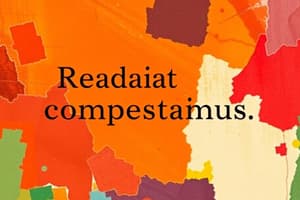Podcast
Questions and Answers
What is a central idea?
What is a central idea?
- The most important point an author tries to make about the topic (correct)
- An example used in an article
- A brief summary of the plot
- A character in a story
What are supporting details?
What are supporting details?
Facts, examples, reasons, and other pieces of information that explain and expand on the central idea.
What is a summary?
What is a summary?
A brief restatement of the article's important details and central ideas in your own words.
What does it mean to be objective?
What does it mean to be objective?
What does analyze mean?
What does analyze mean?
What is an inference?
What is an inference?
What does influence mean?
What does influence mean?
What are story elements?
What are story elements?
What is conflict in a story?
What is conflict in a story?
What does resolution mean?
What does resolution mean?
What is the theme of a story?
What is the theme of a story?
What is the technical meaning of a term?
What is the technical meaning of a term?
What is connotative meaning?
What is connotative meaning?
What is a figurative meaning?
What is a figurative meaning?
What is author's purpose?
What is author's purpose?
What does repetition refer to in literature?
What does repetition refer to in literature?
What does stanza refer to in poetry?
What does stanza refer to in poetry?
Flashcards are hidden until you start studying
Study Notes
Vocabulary and Key Concepts
-
Central Idea: The main point an author conveys about a topic; synonymous with the main idea.
-
Supporting Details: Facts, examples, and reasons that elaborate on the central idea; include at least three details when providing support.
-
Summary: A concise restatement of an article's main points and important details in the writer's own words; includes characters, setting, main events, conflicts, and resolutions.
-
Objective: An approach that is devoid of personal opinions or biases; strictly factual.
-
Analyze: The process of examining components of a text to understand how they function together.
-
Explicitly: Engaging with material directly and thoroughly, avoiding skimming.
-
Inference: A logical deduction based on textual evidence combined with prior knowledge; for example, anticipating a two-hour delay due to circumstances.
-
Influence: The capacity to affect another person or situation positively or negatively.
-
Interactions: Direct outcomes of how various factors affect one another; exemplified by the collective influences on the Wright brothers leading to the invention of the airplane.
-
Analysis: A thorough examination of the interplay of different parts in a narrative, such as setting, plot, and characters.
-
Explicit: Clearly stated details; for example, a timetable that specifies an event's start time definitively.
-
Story Elements: Essential components of a narrative, including the setting, plot, and characters.
-
Conflict: A central issue or problem that occurs within a story.
-
Resolution: The method by which a narrative’s conflict is addressed or settled.
-
Theme: The overarching message or central idea conveyed in a text; often synonymous with the central idea.
-
Technical Meaning: Specific language employed by authors in scientific, mathematical, or engineering contexts to express precise ideas, such as "ovipositor."
-
Connotative Meaning: Words chosen by authors that evoke specific feelings or ideas beyond their literal meaning; for example, phrasing that communicates aggression or urgency.
-
Figurative Meaning: Creative expressions used in language to convey unusual or imaginative ideas; examples include metaphors or similes.
-
Text Structure: The organization of an author's ideas, with various formats like chronological order, problem-solution, cause-effect, and compare-contrast.
-
Author's Purpose: The primary reason an author writes an article, which can include to persuade, inform, entertain, or describe.
Literary Techniques
-
Repetition: The recurrence of sounds, words, phrases, or lines that create rhythm in poetry; includes alliteration, assonance, consonance, and rhyme.
-
Stanza: A grouped set of lines in a poem, functioning similarly to a paragraph in prose.
Studying That Suits You
Use AI to generate personalized quizzes and flashcards to suit your learning preferences.




